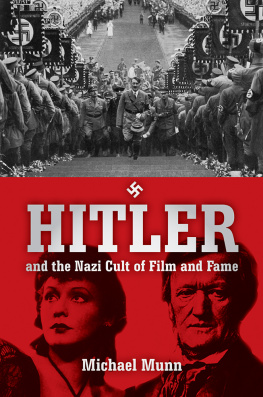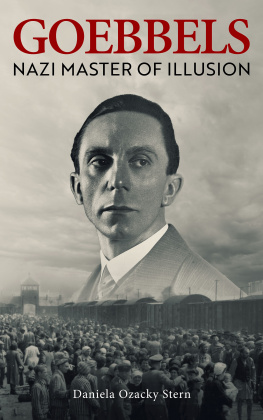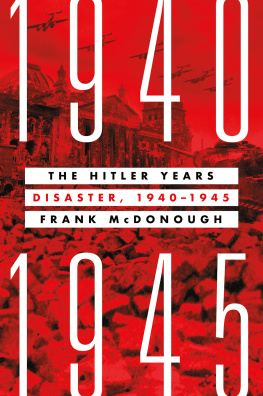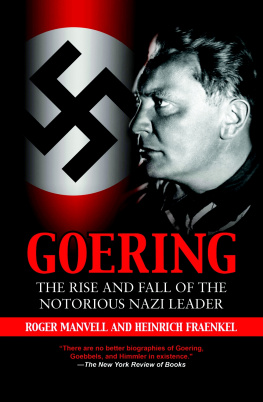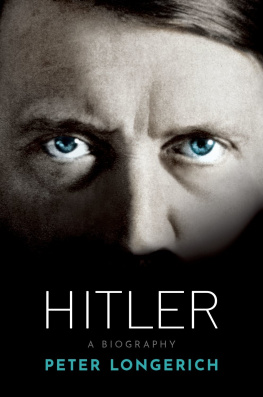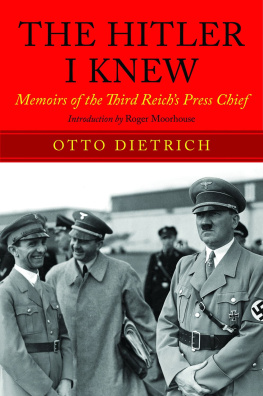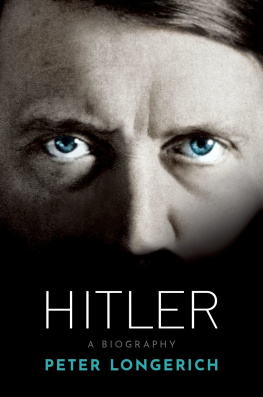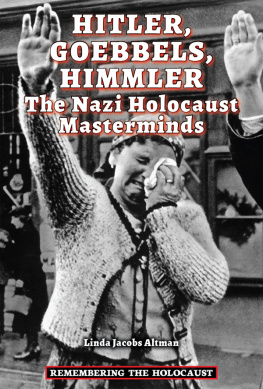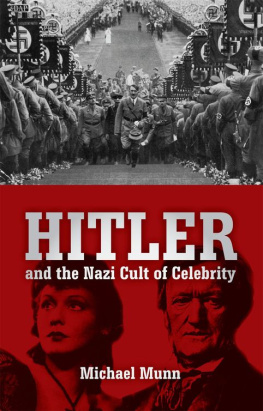HITLER AND THE NAZI CULT OF FILM AND FAME
HITLER AND THE NAZI CULT OF FILM AND FAME
MICHAEL MUNN

Skyhorse Publishing
A Herman Graf Book
Copyright 2012 by Michael Munn
Originally published under the title Hitler and the Nazi Cult of Celebrity by the Robson Press, London, United Kingdom.
All Rights Reserved. No part of this book may be reproduced in any manner without the express written consent of the publisher, except in the case of brief excerpts in critical reviews or articles. All inquiries should be addressed to Skyhorse Publishing, 307 West 36th Street, 11th Floor, New York, NY 10018.
Skyhorse Publishing books may be purchased in bulk at special discounts for sales promotion, corporate gifts, fund-raising, or educational purposes. Special editions can also be created to specifications. For details, contact the Special Sales Department, Skyhorse Publishing, 307 West 36th Street, 11th Floor, New York, NY 10018 or info@skyhorsepublishing.com.
Skyhorse and Skyhorse Publishing are registered trademarks of Skyhorse Publishing, Inc., a Delaware corporation.
Visit our website at www.skyhorsepublishing.com.
10 9 8 7 6 5 4 3 2 1
Library of Congress Cataloging-in-Publication Data is available on file. ISBN: 978-1-62087-727-2
Printed in the United States of America
CONTENTS
INTRODUCTION
T he Nazis had a cult for almost everything. Not every cult was necessarily given a name or was recognised as Nazi policy, but Joseph Goebbels acknowledged that cults were a fundamental element of Nazism. To celebrate the occasion of the end of a heroic life, they had a cult of death. To maintain mystical and symbolic rituals Hitler felt were essential to Germanic culture and history, there was the cult of the blood banner. Hitler, identifying with the Roman emperor Nero, indulged in a cult of fire. One might even suggest a cult of suicide existed although most others were unwilling to be a part of it. And to elevate Hitler to the Fhrer, the party embraced the cult of personality.
Hitler was a product of his own making who created his own cult of personality using the forms of media available to him at the time, which, combined with judiciously formulated propaganda, produced and promoted a carefully honed heroic and almost divine public image. By the beginning of the twentieth century the divine right of kings who held their office by the will of God was quickly giving way to other forms of government, some democratic and some dictatorial, and from the latter rose the cult of personality, which took advantage of all the technical accomplishments of the modern world such as photography, sound recording, film and mass publications. Hitler was, alongside Stalin, one of the first to dominate the political stage through technology. But Hitler went further than Stalin in communicating his image because unlike Stalin, Hitler didnt set out to be a politician. He simply wanted to be famous. He tried his hand at being an artist, then a playwright, then a composer of opera. In the end he found he had just one talent oratory.
It was through his love of art, music, film, theatre and, most of all, opera, and his enthralment with the idea of almost hypnotising his audience with sounds and sights that were inspired by the culture often very lowbrow he embraced, that he developed the techniques which resulted in the great geometrical rallies, the night-time torchlight parades, and the Nazification of the German film industry. There was even a Hitler film in the offing, and for a while he intended to play himself. He was, he once confessed, an actor, and he learned to play the part of the Fhrer how to talk, to stand, to move, to perform. Everything in his public life, and often in his private life as he came to believe his own publicity, was stage-managed. Even the war. He wanted to play the role of a general, and when he tried writing his own script of World War Two, he bombed.
By design rather than as a by-product of his image-building, out of the cult of personality grew his cult of celebrity. He knew no other way to become dictator than by performing. Fame was more important to him than governing, although in his mind they became one and the same thing. Culture and art became politics. Even suicide was a macabre element to his celebrity, his legend and his sense of immortality, which were all irrevocably connected to the final act of his life-long drama; he would write his own ending.
Hitler completely absorbed himself in his cult of celebrity, and his most favoured actors, musicians, writers and other artists could be absorbed into his cult and become great celebrities themselves. All they had to do was promote Nazi ideology. Those that did were permitted to work, and some were pampered and preened into stars, and the public were virtually expected to pay to see the great stars. Artists who didnt support Hitlers ideas were, at best, denied work and, at worst, sent to the camps. Jews never had the luxury of either option. The Jewish question is one of the most deplorable aspects of Hitlers claim to fame.
The German film industry in particular was encapsulated by this cult of celebrity because it was the modern medium of the age. Under the Nazis, cinema became a weapon. Entertainment became policy, and the greatest movie celebrities were advocates for everything Hitler stood for. The extermination of an entire race, played out against the magisterial music of Richard Wagner, whose works were the inspiration for Hitlers new world, became the backdrop for Hitlers own reality show, in which his name was above the title and every celebrity in Germany was a guest star.
The cult of celebrity became the cornerstone of Hitlers Nazism and Hitler loved celebrities, as did his publicist Joseph Goebbels, who ran the German film industry. Despite all their assertions and pretensions about art and culture, these arbiters of taste used their cult for their own sexual obsessions. Starlets and beautiful actresses were as much a sexual commodity in Nazi Germany as they were in Hollywood.
In Aryan Germany, Hitler governed with theatrical tricks. In ancient Rome the emperors gave the people the spectacle of the games to make them love the Caesars, and, taking his cue from them, Hitler gave his people the spectacle of Nazi culture and became their beloved Fhrer. At the heart of his style of government, backed by military and paramilitary might, was his Nazi cult of celebrity. He had nothing else to offer. In the end his obsession with fame led him into grand illusions that were merely delusions, and resulted in the deaths of around sixty million people.
CHAPTER ONE
CELEBRITY, SEX AND DEATH
I f Hitler had nothing better to do, and usually he didnt, he could be found at Berlins Universum Film AG better known as UFA, Germanys largest film studio at Babelsberg, which was just outside Berlin, near Potsdam mingling with the stars. A film director at UFA, Alfred Zeisler, recalled that Hitler visited the studio very frequently. He loved to watch scenes being filmed, and he asked about new plots and new talent, and also about the technical aspects of film-making. Zeisler said that Hitler had a very good grasp of the film-making process and asked extremely intelligent questions about some of the technical problems involved. Hitler also enjoyed coming to the studios to have lunch or dinner in the restaurant of the Film Institute, where actors and actresses gathered.
It wasnt as though Hitler didnt have enough to occupy his mind in 1933, having, that year, become Germanys Fhrer, but he cared nothing for politics, or for governing Germany. He had ministers to do all that. Hitler was obsessed with celebrities. And he knew that of them all, he was the greatest celebrity.

